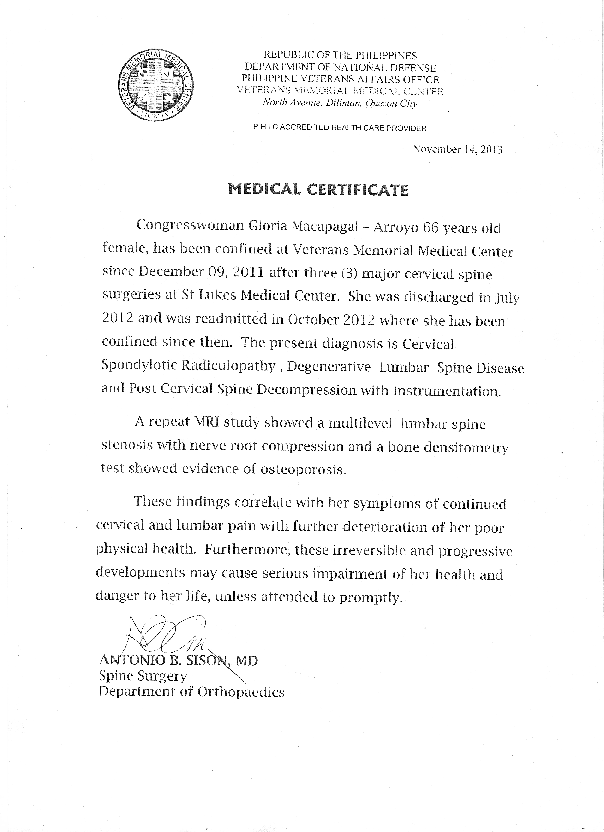Why former President Arroyo should be granted bail
This is a press release.
The word “plunder” has an ominous ring to it. To be charged with plunder is so serious that one can be denied bail. To be found guilty of plunder carries a minimum penalty of life imprisonment, a maximum penalty of no less than death.
This is why the law takes care to specify the nature of the offense. As provided by RA 7080, plunder must include the following elements:
i) The offender was a public official
ii) He or she “amassed, accumulated, or acquired” ill-gotten wealth by taking certain actions specified in that law
iii) The amount of wealth involved was at least Ps 50 Million
At the same time, the law takes care to require the court to consider the offender”s “degree of participation”, as well as “any mitigating and extenuating circumstances” as provided in the Revised Penal Code, when it imposes punishment.
The only plunder case still pending against Mrs Arroyo is the alleged acquisition of ill-gotten wealth from confidential intelligence funds (CIF) of the PCSO. The total alleged amount was a whopping Ps 366 Million, way over the legal minimum of Ps 50 Million. The sheer size of it practically makes one look as good as guilty. Perhaps that was government’s intention anyway.
But what do the facts show in this case?
One: There is no legal basis for charging Mrs Arroyo. Her “participation” was limited only to approving the CIF amounts, as required of her under LOI No. 1282. This was indicated by her marginal notation “OK” on the document requesting the funds.
Two: She was not involved in subsequent actions taken by the PCSO board and management to confirm and release those funds. The Ombudsman itself admitted that Arroyo’s act of approval was “not irregular per se”.
Three: All the disbursements were duly audited and found compliant by COA. Could this be the reason why the COA chairman then, Mr. Reynaldo Villar, was dragged into the plunder charges as well?
Four: No evidence whatsoever has been proffered to show that Mrs Arroyo received even a single cent from the PCSO funds in question, nor that she instructed her co-respondents to use those funds for any other purpose.
In at least two—and perhaps even three—earlier rulings, investigators at the Ombudsman’s Office found probable cause to charge Mrs Arroyo—at the very most—only with graft and technical malversation, but NOT plunder. Nonetheless, the Ombudsman herself, Aquino appointee Conchita Carpio Morales, overruled them and upgraded the charges to plunder, which is not bailable (see Phil Star, 1 August 2012).
In November last year, the Sandiganbayan granted bail to three co-respondents of Mrs Arroyo—former PCSO chairman Sergio Valencia and former directors Manuel Morato and Ray Roquero. But not Mrs Arroyo! Even though the justices also ruled that any evidence of conspiracy in the case was not direct, only “implicit”.
Only one prosecution witness was presented: newly appointed PCSO director Aleta Tolentino. When asked on cross-examination if the prosecution had any other evidence of Arroyo’s guilt apart from the marginal notation “OK”, Tolentino was forced to admit: “That is all we have, sir!”
If this was their only evidence, how could the court have denied bail to Mrs Arroyo? It may help to know who were the three justices who voted against her in the 3-2 split decision. They were Rafael Lagos, an Aquino appointee; Efren de la Cruz, said to be a contender at the time for presiding justice of the Sandiganbayan; and Amparo Cabotaje Tang, the most junior of all the justices, who was nonetheless later named the presiding justice.
It may be recalled that Arroyo was earlier granted bail by the Pasay RTC in July 2012 on a charge of electoral sabotage, which is also non-bailable. So badly did the Ombudsman want to keep her behind bars that she was charged with plunder in the PCSO case even before the preliminary investigation was completed!
As the Sandiganbayan prepares to rule this month on Arroyo’s bail petition, it is helpful to remember that the law requires the court to consider, not just “degree of participation”, but also “mitigating and extenuating circumstances” when imposing punishment (such as denial of bail).
In Arroyo’s case, what could be more extenuating than her devastated medical condition at present? According to Dr Antonio Sison, a government physician and specialist in spine surgery at the Veterans Memorial Medical Center, Arroyo is suffering from “cervical and lumbar pain with further deterioration of her poor physical health” which “may cause serious impairment to her health and danger to her life, unless attended to promptly”. (See attached)
But instead of responding to her medical plight, the administration has even cracked down harder on Arroyo: by restricting her visitation rights, reducing her sunning hours (which are needed for bone recovery), even barring her from attending mass at the hospital chapel !
Truly, no words describe Arroyo’s current plight better than these: personal vendetta, systematic persecution, cruel and unusual punishment. It is a shameful affair that the rest of the world—not to mention the rest of our country—ought to finally speak up about.


